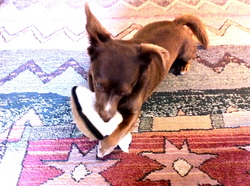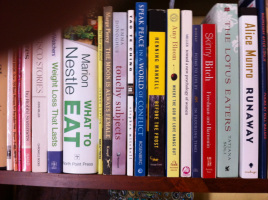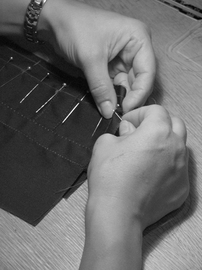 Mothers Day Libation / A. Rittger Mothers Day Libation / A. Rittger So Mothers Day came and went. Each of three sons checked in at some point and each was appreciated. So much more than a day, this motherhood business! Being a mother to these men is no less meaningful than when they were little and going about their development in disparate ways.
On Mothers Day, again a vivid reminder that women are not the only significant caregivers to small children. Two years ago, my youngest son became the responsible parent for my granddaughter after his wife, the mother of their four-year old, died in an accident. I thought of him on Mothers Day. And I thought about my granddaughter and the kindergarten class that would be making cards for their mothers. Was it hard this year?
On Mothers Day my ex-daughter in law from my oldest son's second marriage called, making me happy. They have been apart about four years. At the break-up, I promoted her to daughter, but couldn’t expect to continue in a mother role as she has her own wonderful family. I wondered if maybe this would be the year she moved on. But no, and we arranged to meet later this month. And I will meet the man she is seeing. I love that our relationship continues to matter, and I can share in the life of this special woman.
On Mothers Day my second son who lives in the Philippines called with affection and reassurance that his son, Elison (named for me) arrived from San Francisco safely for a vacation and all was well. All is well, even for one day is good news, especially when it comes from so far away that a mother couldn't easily rush over and fix anything broken or wounded.
On Mothers Day morning’s Starbucks stop, with Foxibeau on his leash, I giggled with Joanna, the barista, as she shared pictures of her baby son who can roll over and who smiles all the time. She is such a proud mother, though sometimes too tired to be at the store by 4 a.m. I remember weariness and childcare issues and offer equanimity to the world and others waiting for a 5 a.m. opening. My habit of walking the dog around the Fillmore Center while drinking a double short soy latte before 6 a.m. isn't all the world is about. But on this Mothers Day, she was there, a proud and happy mother.
On Mothers Day a friend had a party to celebrate women and their mothers. About 20 of us would speak about our mothers. I wrote a poem but didn’t read it because when we paused to eat, I grew restless and went home. I did stay long enough to hear six or seven women speak of their mothers, mostly with fondness, occasionally with bitterness and grief. Some had written poems; others told stories. Corky, my special friend with three sons about the same age as mine always tells good stories about her mother, Nettie. Nettie's recipe for chocolate “Dream Bars” became part of Corky’s families’ must-have treats. Corky brought some, and I ate three before going home.
Here is the poem to my mother that I didn’t read on Mothers Day. I call it “To My Mother With Gratitude.”
I’ll bet my mother never knew
what she did or didn’t do
to make me who I am today.
Nobody special in any way
except for a sitting practice
of self-recovery
and strong urges toward discovery
of how to live, let live, and then let go.
I read it to Corky and I believe she was relieved to hear I had moved on from recrimination and regret. Indeed, who would I be without my mother-wound! Recovery and discovery do seem healthy and worthwhile pastimes. Indeed, all of my family seem thus engaged.
 Dog with toy on rug / Alison R. Dog with toy on rug / Alison R. I’m experiencing some unexpected fallout from the first class of the SPCA course on Small Dog Basics. Dog, what dog? Foxibeau was my friend, a perfect companion, thoughtful, intuitive, attuned to me, a super listener. Sure, he had some unpleasant habits when we strolled the streets, but I overlooked them and never kissed him on the mouth. When he raised his voice at other animals or lunged at strangers, I attributed his behavior to fear or protective instincts.
The gist of the first SPCA class session, a session we two-leggeds attended by ourselves, was that dogs are animals. We were told that our beloved creatures don’t think as we do and don’t know English, or any language for that matter. In fact, their behaviors are entirely about pleasure in whatever shape that might be. Treats, toys, food, walks – these are the kinds of outcomes dogs expect. They will learn words if the consequences result in obtaining any of the above coveted.
Some two-leggeds in the class seemed to know this already. Probably because their newest creature isn’t their first, and they have experience or have taken this course before. I take the class wide-eyed with nothing much to go on, not ever having actually chosen or bonded with a canine companion of my own choosing.
When my sons were young, they would introduce various rescued creatures into the household, and I would not have a voice in whether or not the animal became a family member. Once, when we already hosted Onyx, a dog so big he could sit on the couch from a standing position, Annie came to stay. Shortly, she birthed seven puppies that ate their way through cardboard and cushions. Eventually, friends of my sons gave them fine homes.
On another occasion, a son brought home a pitbull named Susie Creamcheese. That dog roamed the backyard for some period of time. If this all sounds vague, it is. I must have been a pushover mom not to have been consulted about our animal borders. Later, Otto and Leeloo, my oldest son’s pitbulls were dear to me, however, they did live downstairs when I lived upstairs.
But Foxibeau! I chose him! Saw him in a cage at Animal Control, liked the looks of him and picked him out as the one! Doubtlessly, I have imputed to him kindness, sincerity, and other positive human characteristics. I have appreciated his noncritical gaze, his accepting silences, and his willingness to wait in a comfy crate when I have to leave the house – something I do less often than I once did. I have passed on social events to cuddle with Foxie of an evening and watch multiple seasons of “Inspector Foyle” on my iPad.
Signing up for the SPCA class means I acknowledge my new best friend is actually an animal for which I am now responsible. Once he is socialized, others will like him as much as I do. And what a bonus it will be if this training socializes me so well that other two-leggeds like me as much as Foxie already seems to.
 Books I own but haven't written Books I own but haven't written Whenever I feel the urge to write a book, I sit until a title arises. The book for which this blog entry could be a chapter goes by the title Full of Vowels and Consonants: Signifying Nothing. Perhaps it is my Masters Degree in Style and Rhetoric that obliges me to undertake this close reading of the first line of the Beatles’ song “We Can Work It Out” – “Try to See It My Way.”
Unlike the paper I wrote for my Masters in S & R, a solo act, if you want to play along, you may. To get started, speak the line aloud as if it matters. You have some choices in how the words get said. If you can move your head outside the song itself, you could adopt a querulous tone, like it’s not the first time you have suggested this. Emphasize the “try,” dragging out the word until it sounds six to ten letters longer. Let your voice be whiney. You might mentally add an exasperated “please” in front of the “try.”
For an alternate reading, place the emphasis on “my,” implying that in the past you did your fair share of listening to the one or ones whom you now address and, with some expectation of fairness, you rely on an unspoken hope for reciprocity.
To continue, I am assuming a relationship between the original speaker and the significant other(s); ergo I locate the nexus of the problem with the pronouns, both present and missing.
Of the four sentence types, this one under consideration is an imperative sentence. It gives an order to someone unnamed but open to hearing it. I assume so because the song continues, suggesting that whoever received the first line hung around to hear the next 31.
The unincluded “you” at the start of the line is a big mistake, relationship-wise. As another song suggests, “It takes two to tango.” And to omit the necessary other indicates to me that the other doesn’t matter as much as the intensity of the asker’s need to get his needs met, regardless of the feelings of the “unnamed” other.
Consider “Roxanne!” by The Police: “Roxanne/ You don’t have to put on the red light…. The first line shouts the woman’s name. The second line shouts “You.” It doesn’t assume she knows to whom the words are addressed. Roxanne has to know the words are for her. The intensity of that energy signifies deep almost “I-Thou” intention, ala Martin Buber. Roxanne hears herself named about 25 times. There can be no mistake!
From the get go, then, without a named recipient, the Beatle’s line “Try to See It My Way” reveals itself to be hopelessly self-centered, uttered by one whose desperation is directed toward relieving private angst, pain that results from not being understood. This resonates with me. I don’t like it one bit, myself. It seems to happen often.
Now let’s consider the pronoun “it”. Somewhere is the referent, the situation or meaning that “it” denotes. Do the two in this one-sided plea understand what the “it” is that needs to be seen “my way”? I doubt it. This lack of specificity strikes me as purposefully vague and intended to put the other at a disadvantage as her or his mind searches for what exactly is “it”. Her or his “it” might not coincide with the singer’s “it.” A more relationship-savvy person would have clarified “it” and dissipated the surrounding vagueness.
And last but not least is the real problem pronoun “my.” Buddhist studies invite me to grapple with confusion arising from being “me” and not being a “me” who is a separate self. I am the “me” of causes and conditions and this “me” is a delusion that will clear up once I get it. In the Beatles’ “Try to See It My Way” line the confusion presents itself. Since all are one and not separate, the singer’s way is the same way as every way or at least not a way to be insisted upon as the right way. Clearly, it is one way and saying so would be a more open way of asking to be heard.
I hope my exegesis on the first line of the Beatles’ tune helped to clarify issues you might be having with your own communication. Although I am, as always, open to alternate explication, please try to see it my way. Thank you.
 Trainer look-alike Trainer look-alike Last week I met the man who should have been my father, or had I been a different kind of woman, more submissive perhaps, he could have been the father of my children, probably quite a few. However, his real-life role is to help train Foxibeau. I chose him after viewing a videotape of an aggressive dog that looks like my dog and which, according to the voice-over – “his” voice, had bitten his owner in the stomach. I called the voice, because seeing that aggressive little dog, I saw my dog if someone doesn’t step in and do something different from what I am doing. Of course my dog only growls at me when I reach for his white plush squeaky bone or come near him when he’s eating, but these behaviors could be inklings of aggression.
This dog trainer was not exactly a whisperer but his voice was reassuring and certain. We agreed to meet at Jefferson Park. Foxie acquiesced immediately to being handed over to this clean cut, tan skinned man who resembles Dwayne Johnson, a movie actor and semi-retired professional wrestler who goes by the name of The Rock and always makes the world safer for those he loves.
It was quickly clear that for a pack animal, Foxie has been running in a very small pack, with no other dogs to play with and only one old woman who is inconsistent with any sort of discipline. She tends to give the dog his druthers while walking it on the leash. She incorrectly crosses streets when dogs approach so as to prevent her dog from leaping at large dogs or snapping at any other dog whose scent he finds objectionable. And bicyclist beware, runners move over, men who hop out from behind trash cans in the dark of a morning, I can’t guarantee the safety of your pant leg and god help you if you reach out a hand in friendship. Foxie does have one dog friend, Cooper, who lives upstairs and is always on a leash of his own and keeps different hours. You can’t exactly call the two dogs and three owners a pack.
Immediately Dwayne (not his real name but good for this purpose) suggested Foxie begin to make dog acquaintances. But always, and this is a big always, he ordered, I must ensure the SAFETY of my little creature. I have no objection to safety. I believe in it strongly, especially once Dwayne suggested that my creature’s aggressive behavior grew out of fear. But my nature had me disregarding this possibility and I would have taken chances with Foxie’s wellbeing at the fenced dog park we went to the second day Dwayne came to us for our training hour. I was blithe. I suggested we let Foxie off the leash and see what happened. Dwayne knew it was a bad idea and said so because Foxie is even inconsistent about coming when he’s called. My dog, if bitten or attacked, would suffer a terrible setback in trusting me and his two days of training would be erased.
Immediately red flags went up around me and I knew something was lacking in my own sense of the world. Flashbacks of my oldest son as a baby! An untended iron falls off the board onto his leg and leaves a small triangle burn mark! His foot tangles in the back wheel of a bicycle behind me! He carries a glass bottle back to the store for the refund and trips, slashes his thumb and we spend the evening in the emergency room at Children’s Hospital in Los Angeles. It’s a moment in which I want to give Foxie to Dwayne and tell him to give my dog a safe home. But the moment passes. Meanwhile Dwayne is checking in with me constantly, “Do you hear what I am telling you?” “Are you paying attention?” “What did I just say to you?”
How different my life might have been with a father like Dwayne whose concern was to ensure safety in his children’s life. Maybe I wouldn’t be living alone, feeling most safe in my living room. Yes, it’s the past, and right now it’s Foxie’s turn to be made to feel safe. And he might enjoy getting along with other animals. With this in mind and Dwayne’s strong voice in my ear, we are signed up at the SPCA for a course in Small Dog Basics.
 Foxibeau le chien asks to go out. Foxibeau le chien asks to go out. All my activities seem to branch out from Foxibeau. From the soft little red brown creature I venture out, ever mindful of closing the door and leaving behind a crated pliant fellow eager for my return. During my away time, thoughts stray back to him. How long will I be gone? How long have I been gone? Have I been gone too long?
And I credit Foxibeau for recalculating my time commitments. For one thing, I won’t be an usher at the opera this upcoming season. With a dog, an hour and a half before the performance and possibly a three-hour, or four or five-hour opera just doesn’t work. Probably Foxi could manage, but I don’t feel wholehearted anymore about paying the cost of a ticket with my time. I don’t want to be away from this dog that long. Of course, my decision not to re-up as an usher was reinforced every time a lobby assignment was the “non” job of standing at a door through which patrons were not permitted to enter or exit. This assignment triggered some unpleasant reactions: doubt about my worth and dread that I was being punished for an unknown infraction. Came the thought: Only the lowliest would be assigned a lonely job ushering no one at an unused door. Doesn’t feel worth doing when a cuddly creature appreciates me no matter what. No dog-related chore feels too low, and unworthiness never arises.
And it is because of Foxibeau that I haven’t been and won’t be hopping BART at night to zip over to Oakland to the East Bay Meditation Center to meditate or take a class, much as I appreciate that diverse sangha. When I attended regularly, pre-dog, I left the house early, conscientious about allowing for delays under the Bay. The return trip usually began with a wait after 9pm at the 19th Street Station. Back in the city, I would fast-pace it to the bus stop, hoping to hop the 5 Fulton. But I might face a 22-to-48-minute wait. Because I calculate those minutes as Munits, there was never any real certainty about the wait time. So I would invariably make the five-block walk home. Now the whole endeavor feels too labor intensive. I reason that with the dog next to me on the couch I can listen to dharma podcasts from the East Coast, Redwood City, San Francisco Zen Center, all over the world actually. And I have lots of books for study, and at least eight chairs in which to sit and meditate. All I miss are other people and yet with a dog, loneliness doesn’t happen.
Another sacrifice has been all-day classes and meditations. Twice I have asked fellows in my building to add my dog to their dog and care for them both from sun up to sun down on a Saturday. If I want to continue that convenience, I will need to negotiate with them so it is worth their time. Fortunately, Foxibeau has not bitten Cooper, their dog, and he seems to like Cooper’s men as well.
In the pre-dog past I would join friends for lunch following an early movie, but not now. I liked the Ferry Building after a film at the Embarcadero, but not now. Now I take activity breaks for Foxibeau.
Clearly, dog companionship has caused me to rethink what I want to do, for how long and where. So far all the trade-offs have been worth making; there have been no real sacrifices.
Yet, my entire social life can’t come to a standstill. After all, there’s the Oregon Shakespeare Festival and although dogs can stay many places in Ashland, I won’t be traveling with my dog. To prepare for his time away from me, he will meet with a dog trainer. Foxibeau, loveable as he is, behaves like an animal. He’s aggressive with other dogs, particularly large ones; he barks at people he can’t see but hears passing by; he has even lunged and nipped at a couple of people who scared him.
Clearly, Foxibeau factors into all my decisions, and I am not complaining. He helps me choose. Because there is so much to do and so many possible choices, I like having this small friendly red-brown reference point from which to consider.
 Sit/Love Sit/Love If we all have Buddha Nature, what’s the rush?
That’s a question I struggle with these days. What faster progress do I think I need to make? By now, shouldn’t I be more peaceful and less identified with the “causes and conditions” which make up the self I see in the mirror? My uncertainty still brings discomfort. Not knowing feels bad. And I could do with some assurance that it’s okay to be on the way, my way, at my pace.
At this point, I find myself to be a slow-learner, fumbling through written instructions, and unskillful being told what to do, even when I've agreed. I struggle to remember to what I have commited. It’s even an effort to schedule these commitments into the calendar on my smart phone. I’ve come face to face with the unpleasant truth that making and keeping whole-hearted commitments isn’t what I am good at.
Furthermore, I’m finding it hard to confess that I often don’t understand what I am being told. Perhaps, I strive for a “wise elder façade.” Sometimes I fantasize holding up my hand and asking a teacher: “Say it some other way so I will understand." Of course this is out of the question, until I decide to try it.
Even as I look at being a good practitioner, I see how important it is to set boundaries, to value my own beliefs and opinions, and to comfortably stand up for my values without getting defensive. I want something other than anger to empower me. Because knowing or telling my truth is hard, I often feel small or false.
Surely, I am not so different from many who end up facing a wall in a zendo. I, too, like those others, turned to the study and practice of Buddhism because of suffering. Often overwhelmed with emotional pain and frequently immobilized by trauma, I turned to gentle dharma talks and embraced the idea of treating myself with compassion.
So with all the positives of meditation irrefutable, I sit. And having heard it said that the self which result from causes and conditions – such as parents who suffered and could not give love – is not reality, I long to discover my Buddha nature, to embrace compassion, sympathetic joy, loving kindness and equanimity. And until someone wiser than I am tells me: “Alison, you can only do it your way” I will say so to myself and perhaps begin to end my suffering. Then I can work harder to end all suffering, the real work of this personal struggle. And because I have Buddha Nature, there is no rush.
 Taken in Halifax, NS / meddygarnet Taken in Halifax, NS / meddygarnet At almost 6 a.m. it’s still dark in the Safeway parking lot when I drive past the store’s lit windows. Some market decorators have launched red and pink valentine balloons and streamers; though it’s gaudy, it’s beautiful. A vivid reminder of the upcoming Valentine’s Day for which I have no plans.
Emails for restaurants still taking reservations remain unopened. I am ambivalent about asking to celebrate with my once-lover or trying to spend time with the dear friend who is busy making valentine sugar cookies for her bakery business and who hasn’t a lot of time because she now works two jobs.
Because at the moment we are passing a store full of red hearts and pink streamers and I am cradling Foxibeau the dog in the crook of my arm, I think of gifting him a pink squeaky heart-shaped toy. A present to the dog may be this year’s show of love to another.
This is not to say love isn’t in my heart. It is and not just because store decorations have given me the seasonal go-ahead. The love I call love feels quiet and tentative as if exuberant, joyous declarations might summon a loud “Shut up!” And I really don’t want to hear anyone, especially myself, say something dismissive like: “You love a dog?” As if this means I’m lacking. Or “You love yourself? Shouldn’t you be beyond self-centered by now?” Perhaps alluding to the Bodhisattva vow to save all beings.
If loving myself means I invest energy and money to regulate my nervous system and to plow through parts and pieces of this self I find problematic, then yes, that could be called self-centered. Yet calling it so would be a mistake. Smoothing out and soothing frees up energy to direct toward being present and perhaps even temporarily “saving” a few beings whose lives intersect mine.
Love of the self feels more like appreciating an ally than treating myself like an object in search of approval. This love feels like a best friend, like a pink angora sweater worn with a tuck-in peter pan collar identical to the one my best friend is wearing.
It feels like the plump tufted brown pillow my therapist placed beneath my feet before she guided my imagining to experience being swooped up out of the reach of a barbed-wire swirl of self-criticism by a large monkey lest I be overwhelmed. This protective mother monkey swings my six-year-old self high among tree branches. Once out of harm’s reach, the large monkey cuddles and soothes until my curiosity sends me scampering to the ground amid a swarm of playful baby monkeys who groom and play with each other and with me. I let their brown softness and the feel of the pillow remind me of Foxibeau, who runs into my mind to join in as I rest in the comfort of safety from my critical, suffering self.
I feel love as I listen to a story a friend tells about her habitual morning walk around Stowe Lake before sunrise. She recounts recognizing a homeless man bedded down at the boathouse and calling to him: Eddie, are you okay and warm enough? He assures her: Doin’ just fine, thanks. Then he says no to the money she offers him to buy a warm jacket. Resuming her walk, she and the other morning joggers hear Eddie’s voice yell out her name. I love you, Valerie, he yells. If you ever aren’t married, I’ll marry you!! She yells back her no thanks she’s going solo, as other joggers, older Asians, not understanding his outcries rush to her to be reassured she is safe.
This feeling I call love is gently laced with humor; it is love that giggles at the raspy sound of a growing growl in a little dog’s throat. It’s hard not to smile. Hard not to laugh although shushing is surely required.
It is a gift to myself of comfort and forgiving. In my mind-heart I hold the image of a loving presence fierce to protect the child in me from the pain still aching to be healed. And this love’s authority commands in her kindest voice that “Shut up” be vanished from the heart’s vocabulary. With love and gratitude, I wish those who read here: a happy Valentine’s Day.
 Logo / AlBakker Logo / AlBakker “Pain is unavoidable, but suffering is optional.” When the weight-loss leader spoke those words during the meetings I attended to lose 30-plus pounds, I didn’t know how profound were her words. That was more than 10 years ago, long before I meditated or heard the dharma. She explained that from a Buddhist perspective, restricting food intake, cutting out night time binge eating or doing three days of exercise could be painful, but complaining and deluding ourselves into thinking pounds would melt away if we just sat in a chair at meetings would cause us to suffer. In other words, we had some control over suffering. Buddhists consider suffering a fact of life. Indeed, it is the Buddha’s First Noble Truth. According to Buddhist Studies for Secondary Students: “There are four unavoidable physical sufferings; birth, old age, sickness and death. There are also three forms of mental suffering; separation from the people we love; contact with people we dislike and frustration of desires. Happiness is real and comes in many ways, but happiness does not last forever and does not stop suffering. Buddhists believe that the way to end suffering is to first accept the fact that suffering is actually a fact of life.” That word “suffering” doesn’t quite explain this concept central to the dharma and to meditation practice. I have read that the Pali word Dukkha usually translated as suffering can also be thought of in terms of something being “intolerable,” “unsustainable,” “difficult to endure,” and can also be “imperfect,” “unsatisfying,” or “incapable of providing perfect happiness.” When my Soto Zen teacher speaks about the First Noble Truth, she uses the term “dis-ease” to describe this human condition called suffering. Any of these words would describe quite a few aspects of my daily life. Even seemingly insignificant moments show me how quickly I cause myself to suffer. A recent though temporary onslaught of disappointment, impatience, annoyance, futility, anger and mild self-loathing got triggered by my thwarted attempt to sign into my Starbuck’s account so as to register for 20 bonus stars by mid-February. Without my Starbuck’s password at the ready, I chose my Facebook sign-in option. The password to that account was also not in the forefront of my thoughts, ergo I could not sign up for all those bonus stars. As those feelings short-circuited my ability to be mindful of or kind to any other person, additional suffering ensued. Suddenly from my throat issued a caterwauling of “me-ows.” Why is this happening to me. Ow! I’m frustrated, suffused with anger. Shortly after dealing with frustration and disappointment, I began to blame those corporate somebodies who sent emails addressed specifically to me. Clearly, form letters don’t care that I start each day buying a double-short soy latte and have for years, and that I buy Abe his oatmeal – I would want this predictability and generosity to count for something. Just this past week, before 6 a.m., I made an emergency run to a nearby Starbucks because my Starbuck’s location was out of oatmeal, caramel, skinny vanilla syrup, and compost bags. So why do I not have uncomplicated access to my account based on good karma? My prefrontal cortex gets it that Starbuck emails are unrelated to my comings and goings in one neighborhood in one city in its vast and impersonal universe, although the emails are addressed to “Alison.” To be of no consequence in the on-line world, no matter how personal sounding the emails, shouldn’t matter. And in any brain function save the reptilian brain, suffering wouldn’t happen. But that familiar childhood need to matter stored in the old brain still triggers me. Rather than react to an impersonal, all-too-human glitch, I might have paused to remember the words of my weight loss leader: “Pain is unavoidable, but suffering is optional.” I could have taken three deep breaths, let go of thoughts and grasping. I could have looked at the branches of winter trees and sidestepped suffering altogether. However, in the larger picture, compassion allows me to feel gratitude to the Starbuck muckymucks for reminding me that insidious old patterns of wanting to be special needn't be a source of suffering.
 Sewing a rakusu Sewing a rakusu In my meditation practice, I am surprised to find myself preparing to participate in the ceremony of Jukai, receiving the Precepts. The ceremony is part of the training lay people who are serious students undergo to show that they understand what it means to live by precepts, which are not commandments, but filters Buddhists use to evaluate and shape how they will live on the Bodhisattva path.
A part of the ceremony will be getting a special name from my teacher. I have already begun to imagine what she might choose to call me. It could be a beautiful name like “well grounded cloud dweller” which does sound paradoxical and probably won’t be the name sewn into the underside of my rakusu, the blue bib-like covering I will begin to craft myself as I prepare to take the precepts. It’s possible, considering my homemaking skills that sewing my rakusu, even with help of sewing teachers may take years. My friend Kate who is a fine seamstress can only help me with five percent of the sewing. Without a doubt, the better stitches will be Kate’s. But I digress.
I have read that the name I will be given can be either a label that influences how others see me, or a kind of goal or motivation. Back in 2005 while I was doing Pathways, a program in Dallas, Texas, I was given the name “Porcupine” and had to earn back my own name. More recently I temporarily acquired a name the evening my teacher Lien, fellow student Sam, and I went to Japantown to pick up items Sam and I would need for one-day sittings and longer extended stays, should we agree to undertake them.
After I had parked my small car, a man driving a Toyota stationwagon pulled up beside me as I momentarily paused outside my car. He asked me if I would mind moving forward or backward to accommodate his large car. I swear I didn’t say aloud, “Yes, I do mind,” but that became my name for the next several minutes as I reseated myself and backed up the car. “You have a lovely voice,” the inconveniencing man commented once the mission was accomplished. His compliment clearly meant he heard, “Of course, I don’t mind. We are all one just in separate cars and mine is small while yours is big.”
Yet Sam, the other student, is certain he heard me say, “Yes, I do mind.” Bundled into the back seat, he could have been mistaken. Nevertheless the name I had for the evening was “Yes-I-do Mind” which I chose to understand as “Yes- I-will Mind,” a name indicating my willingness to be inconvenienced and to accommodate all beings, cheerfully and not.
I have never really appreciated having names pinned on me and I didn’t that evening. Even a positive appellation like “writer” hasn’t made me glow. Yet as my practice passes from what Sam calls “Zen light” to what I feel is “Full On” Soto Zen, I will accept any name my teacher pins on me and know that she has my growth and understanding of the dharma at heart. I will remind her as we get closer to the ceremony of Jukai that the name “Reluctant Dragon” is already taken.
 Resolutions / safr Resolutions / safr Enough time has passed since the noisy arrival of 2014 to put me safely out of range for resolving to improve in the upcoming year. However, I have one “must do” in 2014. It’s about Foxibeau. He found the celebratory bomb blasts in Western Addition so traumatic that the little low-to-the-ground reddish mutt still sees any darkness as a signal for alarm. Here it is almost mid-January and he is still reluctant to take those important morning and evening strolls around the neighborhood. Tugging and coercion aren’t working. Friends suggest food bribes and that’s an option should he continue to balk.
Expecting that there will be a Fourth of July, I resolve to start The Fox on homeopathic remedies or tranquilizers, so celebrations become less traumatic. If, in 2015 I am invited to a party and the city plans to make extra noise, I won’t have to leave early to race home and spoon the dog. Apart from regulating the dog’s nervous system, I face the New Year with no plans to bloom a whole new garden of good habits in 21 days.
I don’t resolve to get back to regular Monday blog postings. I reason that if silence is truer to my real creative rhythms, I must trust the feeling of having nothing to say. There have been times in the past year when I kept silent about my struggles to be close to a son or two because no matter how important those struggles felt to me, sharing could feel to them like an invasion of privacy. All three sons are articulate and introspective; they could post their own mental formations if they wanted to.
Also not on a list of resolutions is taking time for thoughtful meal planning and perhaps actually measuring ingredients and spices rather than tossing something in a skillet with no concern even for expiration dates. Indeed, my oldest son has been posting on Facebook the exotic Indian dishes he creates almost daily, and I know he would gladly send me the recipes. He said he drove to Danbury, CT to a real Indian Grocery store and stocked up on all the basic ingredients he would need. I could go the whole route without leaving the neighborhood. There’s an Indian grocery near Safeway on Fillmore.
For the briefest of moments I almost resolved buying a bicycle to ride to Starbucks early in the morning. I could go slowly and Foxibeau could run along beside me. I let go of that notion despite my second son being a practically professional bicyclist, threading his way through the hills of Cebu, an island in the Philippines. It’s wearing the helmet that really tops off my reluctance. You see, avoiding hat-hair has long been a foible. And I would have to undo umpteen decades of foolish vanity in just 21 days to make it a habit. And then it might rain and I definitely could not let Foxibeau splash through puddles. Water knee-deep for me would drown the little critter.
Had I been resolving anything for the new year, I would have had a struggle with what to do about vanity. Once my vision improved through cataract surgery, wrinkles and discoloration hidden by optical occlusions surprised me. I beheld my aged face. And equanimity in the face of it did not surface. It’s a good thing I resolved nothing because at the first promise that two weeks of applying a product would ameliorate a lifetime of surprise, sadness or concern, I bought products.
In summation: I did not resolve to post regularly as I had done for more than two years. I did not vow to read recipes nor to discard expired spices. I did not promise to purchase a bicycle or a two-wheeler of any kind. I laid down no strictures against covering dark spots, no matter how ineffectively. But I did resolve to administer to Foxibeau homeopathics or tranquilizers at the end of June, midway through December and right away if the Niners make it to the Super Bowl.
|
 Mothers Day Libation / A. Rittger
Mothers Day Libation / A. Rittger 








 RSS Feed
RSS Feed